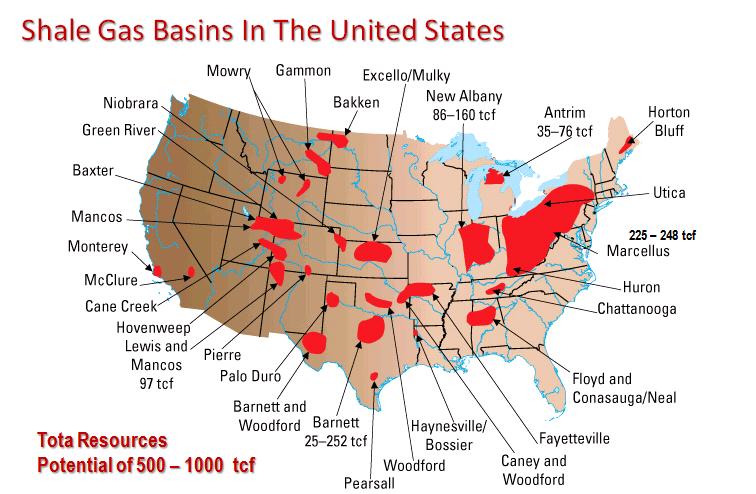
Unconventional natural gas, and particularly shale gas, trapped in deep shale formations (usually made of clay), is in the process of shaking up the world energy balance. In the U.S., the first country to attempt large-scale extraction of reserves long considered inaccessible, the economic impact has been considerable. Hundreds of thousands of jobs (600,000) were created in the wake of prices three times lower than European rates, which François Hollande is clumsily attempting to freeze. The petrochemical industry is relocating back to industrial countries where production had been considered gone for good. In a development unimaginable five years ago, the U.S. may even export gas that it was set to massively import, as evidenced by the recent construction of enormous unloading terminals for LNG carriers… now ready to be reconverted for export.
According to estimates by the U.S. Energy Information Administration, America’s accessible natural gas reserves have increased dramatically, and are equivalent to a century of consumption. Today President Obama sings the praises of an energy revolution that he was very skeptical about at first. But the facts won him over: the decrease in the price of gas and its abundant supply have offered relief to households and industry, which are very sensitive to the price of hydrocarbons. Natural gas has also reduced the proportion of electricity that comes from coal, which has a significant impact on air quality, the major battle of the Obama administration. Coal provides 42 percent of the country’s energy supply, the lowest level since 1949, and this downward trend is expected to continue. As for the nuclear industry, it has simply been knocked out by competition from gray gold, even after receiving loan guarantees from the government meant to revive the industry.
This revolution, which China has decided to pursue even as Europe wavers (the French government is discretely reconsidering lifting the ban on drilling…), does have a dark side, however. Methane is a powerful greenhouse gas and hydraulic fracturing is not without environmental risk. If shale gas production is badly managed, with no limits or CO2 sequestration measures, it could end up being even worse than the coal combustion that will suffocate the planet sooner or later if we are slow to make frugal choices in relation to carbon consumption.

Leave a Reply
You must be logged in to post a comment.